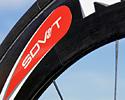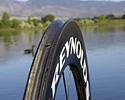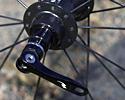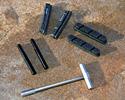
Recently on Cyclingnews.com |
On Test: Reynolds SDV66 T wheels, October 31, 2008
Race tested, Tour proven
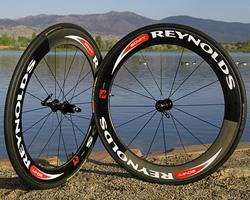
|
Reynolds carbon wheels have been familiar to US road racing fans having long sponsored the HealthNet p/b Maxxis bike but the 2008 season brought a huge leap forward in visibility with the French Agritubel at the head of the Tour de France. Cyclingnews' Chris Davidson glues up some tires and takes a deeper look at one of Reynolds' speediest offerings.
The SDV66 T wheels take Reynolds into a deeper territory than ever before with a 66mm-deep carbon tubular rim that Agritubel's yellow jersey clad Roman Feillu used to cut through the summer heat of France this past July.
Though the 66s are tall, claimed rim weight is just 430g each and the complete wheelset comes in at a remarkable 1370g for the set (630g front, 740g rear, without skewers). More help comes from the Reynolds-badged hubs made by DT Swiss - based on the trusted 240s model - and DT Swiss Aerolite spokes in a minimal 16/20 count (radial front, two-cross/radial rear).
Our test set also came with some 119g Reynolds skewers with titanium shafts, Reynolds carbon-specific brake pads, two valve extenders and a dedicated spoke wrench. Once the glued dried on a pair of Conti Sprinters, we hit the road.
Smooth, stiff and fast
|
|
|
|
|
|
|
Right out of the box these wheels roll incredibly smoothly: the cartridge bearing hubs, the damping properties of the carbon rims, and the suppleness of tubular tires all added up. But equally apparent in this mix is the stiffness thanks to the very deep profiles, radial spoking patterns and high spoke tensions. So smooth and stiff; this is a good start.
These wheels were designed to save you watts on the flats, and with their NACA-designed airfoil profile and the hidden nipples they certainly feel fast in the wind, almost regardless of what direction it is hitting you from (though Reynolds doesn't have objective test data to show just how much faster… as least not yet).
Still, there is a lot of surface area on the front end of the bike for side winds to play around with but we found these wheels to be more stable in varying conditions than a few other carbon wheels we've sampled nonetheless, some even with shallower rims.
We won't try to offer a real answer here (though perhaps the somewhat blunted nose is partly responsible), but despite the SDV66's modest susceptibility to crosswinds, they still felt planted.
The SDV66 T might not qualify as a true climber's wheel but at sub-1400g, these wheels definitely did not suffer when it came time to head uphill. If anything, the extra wheel stiffness only added to their ability to accelerate, especially when out of the saddle. In this regard the SDV66 would likely be a good choice for most any ride/race with varying terrain and serious climbing, short of a straight vertical time trial.
Dry braking performance was also excellent and inspired maximal corner entry speeds (due to good weather during the test period we were unable to test in the wet). With the Reynolds supplied pads, braking was very responsive and linear, pulse-free, and provided enough power to lock either wheel at will. Moreover, Reynolds' latest pads offer a less grabby feel than the Swiss Stop Yellow King pads that were previously supplied with the company's higher-end wheels.
We also have to give a nod to the strength of the Reynolds SDV66, as an unfortunate flat at the weekly criterium resulted in a five-mile ride home on a flat front wheel. Thankfully the wheel was still dead straight afterwards [we don't recommend this treatment!], especially since the internal nipples would require stripping the glued-on tire for the repair.
Deep, strong, smooth, fast
Reynolds has produced a wheelset that genuinely shines - TdF yellow in this case - in the face of varied terrain, wind, hills and spirited competition. You may want something else for the Mt. Ventoux time trial but for just about every other situation these wheels deliver. Adding to the confidence on the road are the fantastic braking, stiff and responsive ride, bulletproof hubs, and a strong carbon rim that has no rider weight limit.
The price is high but still surprisingly reasonable as compared to the competition and considering the performance you get in return, plus the package is very complete meaning you won't have to spend much more. So if you have the coin, definitely put these wheels on the 'A' list.
Price: US$2200 (front and rear wheels, skewers, valve extenders, brake
pads, and spoke wrench)
Weight: 1370g/pair (630g front, 740g rear, plus 119g for skewers)
Pros: Light, stiff, aero, strong and reliable. All the necessary bits
included
Cons: Deep section leaves you liable to the wind
Cyclingnews.com rating: ![]()
More information: www.reynoldscycling.com
Photography
For a thumbnail gallery of these images, click here
Images by James Huang/Cyclingnews.com
- Reynolds' SDV 66 carbon tubulars slice through the air with their 66mm-deep profile.
- According to Reynolds, the rim profile uses NACA-developed airfoil shapes.
- Internally located nipples make the wheels harder to true but the smaller spoke holes allow for more tension.
- Braking on our SDV 66 T testers was linear, responsive and powerful with the included carbon-specific pads.
- The well-formed tire bed provides a good bond surface for gluing.
- The Reynolds-badged hubs are made by DT Swiss and based on the 240s design.
- The front hub is radially laced…
- …while the rear is laced two-cross/radial to handle drive forces.
- Reynolds includes a pair of skewers with the SDV66.
- Brake pads, valve extenders and a spoke wrench are also included.

